Noticed gaps in your child’s learning since homeschooling? We offer a solution.
The Problem: Gaps
More often than not, the problem doesn’t actually lie with your child. Most reading and spelling problems are caused by gaps in the reading or spelling curriculum. Gaps are created when a child might miss an incremental step, or when information is taught in an illogical sequence.
The issues with boys and literacy are well documented. The broader concern is how poor performance in literacy can have negative knock-on effects in other areas. Not just with their schooling, but in all aspects of a boy’s life – especially their self-esteem.
Getting boys to read is tough!
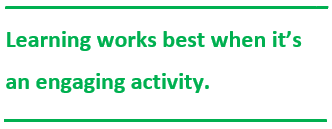
Literacy for Boys developed material that boys love to read.
Learning is more enjoyable and rewarding when it is an active process. Boys often dislike the sort of comprehension work and texts they are given – mainly because it isn’t relevant to them. Getting your son to complete reading activities can be particularly frustrating – and remote learning surely adds another pressure.
Literacy For Boys operates on an engagement model which we call ‘ABC‘.
Audience specific – Boy focused – Content driven
Imagine if boys could choose topics that they like? Engagement leads to a motivation to read. Improved literacy follows. We have the proof that our program boosts literacy and turns reluctant, poor readers into more confident, engaged readers.
Bridging the literacy and learning gaps with LFB
When I developed Literacy for Boys I had a clear image of a connected sequence in my mind. I spent many hours analyzing each and every step. I wanted every boy to have the benefit of clear, concise, well structured, engaging and fail-proof activities.
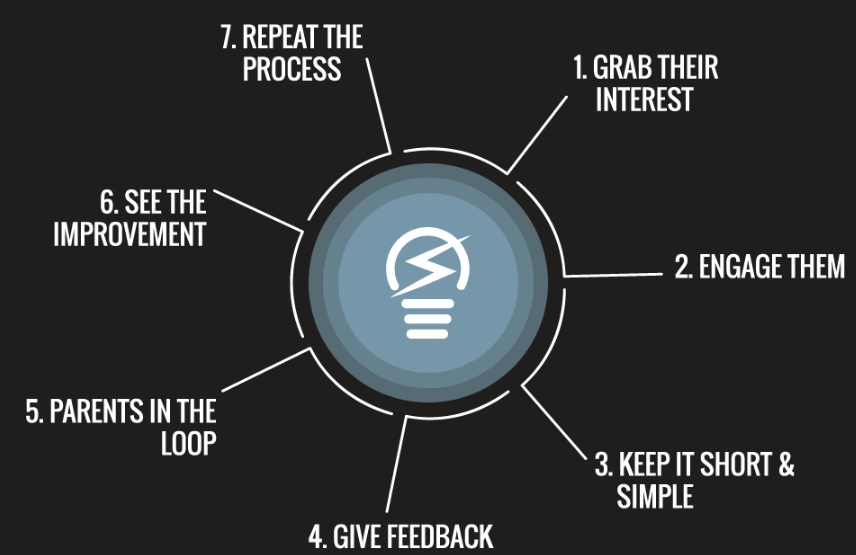
Each step is connected. LFB aims to make reading an enjoyable experience for boys.
Some words from teachers….
Literacy for Boys has been a go-to program to close reading and spelling learning gaps in a number of schools. It is easy, engaging, offers feedback for students and can be added to your literacy program.
- “All the students find the topics interesting and at no stage do I ever hear the students say they feel ‘dumb’ as the topics are age-relevant. LFB is compatible with text to speech which makes the program very inclusive for the dyslexic children who struggle to read but comprehend well – it just removes the unnecessary pressure for them. It is lovely to come across a program that has a child’s best interest at heart.” – Jo, classroom and Support Teacher Upper Primary/Early Secondary
- “Our school commenced using the LFB program in 2018 as a tool to assist students to develop their literacy skills and foster a positive attitude towards reading. Students found the program fun, interesting and engaging. A majority of students had significantly improved their literacy skills.” – Sue, Learning Support Teacher Years 4 , 5 and 6
-
“Before we started LFB we took a snapshot of the students’ current levels in reading, comprehension and spelling using outsourced independent tests. At the conclusion of the 20-week trial, we used those same tests to measure the distance travelled and were delighted to see an increase of nearly 12 months across all those areas. Most important was the anecdotal feedback from our students who were engaged and enjoying using the program. The program allows for differentiated delivery of content in an enticing platform that has captured not only the interest of our boys, but equally our girls who enjoy the program just as much.” – Gerard, Deputy Principal
See what parents and boys have to say….
- “Since Caleb has started LFB there are no more tears for either of us. For the first time, he is remembering his spelling words – he scores 100% every time that I verbally test him. He now has so much confidence just from the short time we have been doing your program that he now asks straight away if he doesn’t understand something and we go over it again until he does understand it. I am just so excited. THANKYOU THANKYOU THANKYOU! LFB is really making MASSIVE POSITIVE changes to our son – thank you so much for making the program accessible. It has changed our lives.” – Michelle, mother of Caleb
- “I really enjoy the videos and the pictures. I like the questions and the challenges.” – Deacon, class 4A
- “The videos make me more interested in reading. I really like the spelling and the questions.” – Fletcher, aged 9
- “The program is online and information is current and suited predominantly for boys’ interests. My son is very excited to use it at home and in class.” – Samantha, mother of Andreas
- “My son is in Year 8. This is the first program that he has willingly engaged with. The topics have been the key to keeping his interest. We started to see the benefits after only 4 months.” – Bec, mother of Ryan
- “This program is full of fun and interesting topics that have really grabbed my son’s attention and make him want to do the activities. Highly recommend it.” – Kate, mother of Alex
We are offering a FREE 2 week trial of Literacy for Boys. Try it for yourself and see how it works for your kids (8 years to 15 years). Contact us today: info@literacyforboys.com.au
Check out our blogs for more ideas and tips.
How LFB is gaining real results in improving literacy
Boys Love LFB – Here’s what they have to say!
Get boys reading in the digital age
Why write? Tips for reluctant writers
Brought to you by Tanya Grambower

Literacy for Boys: NEW topics to engage your kids in literacy!
New to LFB?

From fun topics to suggested books, we’ve got your out-of-school time covered
For new LFB members, you can explore dozens of themes in each level! Read and learn about disgusting animals, Lego, zombies, gaming, adventure, famous warriors and nearly every sport is covered. We cater to kids’ interests in science, sport, history, real-life (and fictional) adventures, haunted stories, secret agents… our list continues into the hundreds. If you’d like more information about a particular level/age group please send us an email at info@literacyforboys.com.au and we’d happy to answer any questions.
For our current boys and girls who are already members….
Check LFB regularly for new topics! Here is a glimpse of what is coming:
- reviewing the X-box game: Sea of Thieves
- Strange Spiders (did you know that a guy employed spiders as bodyguards?!)
- Science topics such as: Velcro, our Skeleton, the Human Eye, How does Anaesthetic work? …..and more.
- Missing your sport? Strap yourself in for Sport Showdown (all ages). Read about Megan Schutt (Australian cricket fast bowler), NRL Star Players, Rugby’s Kalyn Ponga….plus more.
- Racing motorbikes (older students)- read about this young legend called Remy who raced internationally at only 12 years old, has had nail biting crashes and is taking the world by storm. Want to know why road bikes have such smooth tyres? We have the answers.
- Surviving River Rapids (older readers) – imagine if your canoe suddenly surged out into the open where a torrent of water formed a field of rapids? This tale is more nerve-wracking than the scariest ride at a theme park!
Do you have an idea for a great topic? Send us a message at info@literacyforboys.com.au
See what parents and boys have to say….
“Since Caleb has started LFB there are no more tears for either of us. For the first time, he is remembering his spelling words – he scores 100% every time that I verbally test him. He now has so much confidence just from the short time we have been doing your program that he now asks straight away if he doesn’t understand something and we go over it again until he does understand it. I am just so excited. THANKYOU THANKYOU THANKYOU! LFB is really making MASSIVE POSITIVE changes to our son – thank you so much for making the program accessible. It has changed our lives.” (Michelle, mother of Caleb)
“I really enjoy the videos and the pictures. I like the questions and the challenges.” (Deacon, class 4A)
“The videos make me more interested in reading. I really like the spelling and the questions.” (Fletcher, aged 9)
“The program is online and information is current and suited predominantly for boys’ interests. My son is very excited to use it at home and in class.” (Samantha, mother of Andreas)
“This program is full of fun and interesting topics that have really grabbed my son’s attention and make him want to do the activities. Highly recommend it.” (Kate, mother of Alex)
Check out our blogs for more ideas and tips.
How LFB is gaining real results in improving literacy
Boys Love LFB – Here’s what they have to say!
Get boys reading in the digital age
Why write? Tips for reluctant writers
Brought to you by Tanya Grambower

The School of Mum and Dad due to Coronovirus
By this Friday all schools in Australia will have closed their doors, and there’s no timetable for when they might re-open.
Working parents, who may need to work and juggle childcare, will have to fill the gap. While no-one expects them to replicate school, there is plenty of online help to avoid boredom.
Will schools provide the resources?
If your school already puts work online, using Google Classroom, Education Perfect or similar software, it is likely that this will continue.
Secondary schools generally make more use of this than primary schools, and older pupils are more likely to be in the routine of checking it and completing work. They are also more likely to have their own laptops.
Some schools are requesting older children follow their existing timetables, with some active lessons, involving Google Hangouts and virtual classrooms, and some passive lessons, where children get on with work independently.
Each school will have its own system: some will continue to post lessons on Google Classroom daily, others less frequently.
Online systems usually allow for children to submit work and have it marked, but again that will depend on individual schools.
What about other resources?
Lots of schools subscribe to websites. Here at Literacy for Boys we have experienced a surge in activity.
“We have been contacted by more than 100 schools looking for a program that will support their literacy teaching. We have had three times the normal traffic.”
The website has already added extra processing power in order to cope with increased demand and we are adding new topics to keep students motivated. Our new “Messages” feature is proving popular as students give feedback about topics and add requests for new ones.
As a teacher and tutor for over 20 years, I do have some simple advice for parents who may not have access to online resources or even laptops or tablets (or even want their kids to have a break from technology): Buy a textbook, go back to basics.

Classrooms are empty but learning can continue, according to experts
What other resources are available?
Your school is likely to send out recommendations along the lines of free resources. You may like to check out the following:
- Tynker – offers coding lesson for kids
- BrainPop – offers animated movies on topics in maths, science, arts/music and much more
- Creative Bug – offers craft lessons, drawing and origami
- YouTube’s Free School offers a range of videos looking at subjects as diverse as the coral reefs, animals and the solar system.
- The organisation behind the Ted talks has a division called TED-Ed, full of “lessons worth sharing” from teachers around the world.
Will e-learning work?
Some would argue that the education system needs a rethink. This is a period in time where we can put new ways of learning to the test. The key lies in using online education to inspire our kids to learn. A mountain of information is easily accessible with just the click of a button.
However, when schooling from home establishing a routine is vital. Ensure that you have ‘separation’ between home life and school – don’t spend the day in pjs. Have all resources ready and computers charged. Read every day. In lieu of school assembly, start the day with a mindfulness session and a schedule for the day.
School – life balance
Yes, learning is important but this should be balanced with other activities. Getting out of the house (where appropriate) each day with the family is a bonus.
Play board games, bake together, get into the garden. Let your children use apps like Zoom or Skype to keep in touch with their friends. Houseparty is another popular app, however, you might like to check the latest safety claims that have arisen.
Netflix, Foxtel or other streaming services can be used innovatively, by watching the old movies you loved from your childhood.
Encourage reading – World Book Online has just made their collection of 3,000 ebooks and audiobooks available for free for children to access at home.
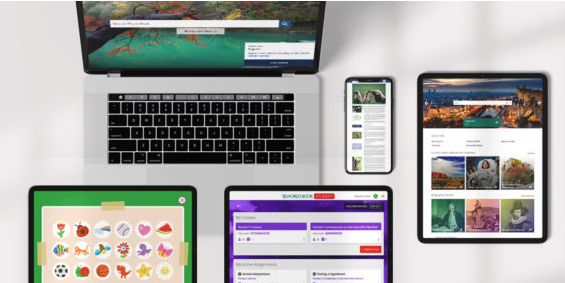
Online learning to help educators and parents
Most importantly, keep talking as a family, particularly about the future. Catching up with their friends at school, celebrating birthdays, seeing their teachers, resuming sport – we will all appreciate normal life when it resumes.
Check out our blogs for more ideas and tips.
How LFB is gaining real results in improving literacy
Boys Love LFB – Here’s what they have to say!
Get boys reading in the digital age
Why write? Tips for reluctant writers
Brought to you by Tanya Grambower

Parent Checklist: How to support student learning at home
As schools clamber to prepare for remote learning, many parents are fearful that there will be gaps in their children’s education. Try not to let this disruption cause stress in your household. We have asked teachers for some tips and also parents who are pros at home schooling. Here are some simple strategies for coping with this change, to make sure that learning continues effectively.
1) Routine is essential
Set up a regular place for your children to work and a set time in which they will complete activities. This will take away the stress of telling your children when to start. Aim to keep to their school timetable and include breaks. If you can set the habit, your kids will form the correct mindset to complete school work.
“Children need normality, familiarity and structure. So keep to a routine. It makes home schooling easier and helps children to realise this is not a holiday, and that teachers are expecting learning to take place to some degree.” L Rosenblatt, experienced teacher
2) Break it down into smaller bits
Certain learning tasks can seem daunting. From writing projects to spelling lists to major research assignments, the idea of where to start can be discouraging for many kids. To avoid becoming overwhelmed, break the task down into smaller sections to be ticked off each day. If you aim to do this, the tasks become more manageable and less likely to cause worry for your child.
3) Organisation
The night before lessons commence, ensure that the workspace is ready: necessary equipment, paper, laptops charged and all potential distractions removed. The health benefits of a nutritious breakfast are really important and make sure they drink plenty of water. Eating breakfast has been linked with improved English and maths skills in children!
4) Take a breather
Research reflects that people (including children!) have difficulty concentrating for periods longer than 45 minutes at a time. Either set the oven timer to make sure your children have a short break to step away from their work briefly, then return to the task refreshed.
Teacher Emily Profitt advises parents, “Making learning fun is vital – so baking, painting and getting out and about in the garden are essential to reduce boredom.”
5) Don’t be afraid to ask for help or guidance
Remember that you are not a trained teacher or tutor. Your child’s classroom teacher/s should still be accessible at this time. They are a valuable resource, so reach out if you need. Be conscious that other parents may be also seeking support, so you may not receive an instant response. Tip: Try to compile a list of questions during the day and only check in with the teacher at the end. We’re here to help parents too, so send us an email if you’re stuck on a literacy problem!
Contact us info@literacyforboys.com.au
Some interesting advice from mums who home school:
Home education was increasing in Australia before COVID-19, so there is plenty of wisdom and knowledge for first-timers to draw on. Let’s look at two examples from mums who live in remote areas….
Barb McKimmie lives in the remote Kimberley region in Western Australia. She says that the biggest
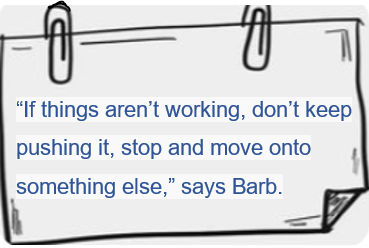
A great quote from an experienced mum
hurdle was not having a break from each other, but apart from that, it can be a satisfying experience. Barb has learnt many tricks to overcome difficulties.
To help keep things fresh, Ms McKimmie and her family have a little tin full of ideas for “Brain Breaks”. These include things like 10-star jumps, run around the house, choose a song to dance to, keep a balloon in the air.
“All activities need to have a clear ending or time limit so they come back quickly.”
Kasie Scott is a mother of six and lives in outback Queensland. She said people should not be worried about being thrown into home tutoring.
“Organisation is the key for me. Establish a routine that works for your family and stick to it,” says Kasie.
One of Kasie’s top tips is to take schoolwork outside, or at least somewhere else in the house, just to mix things up. Other ideas include: writing with chalk on concrete, use the kitchen for counting or measuring and taking the kids outside to spell words out to each bounce of the ball.
Kasie admits that “it’s definitely not all roses and beans, some days are hard”. She suggests reaching out to others is an important coping strategy so communicate with your school, other parents and Facebook groups.
“Don’t give up, even if you’ve had a bad day, shut the door, start fresh again tomorrow. We’ve had many, many of them.”
Check out our blogs for more ideas and tips.
How LFB is gaining real results in improving literacy
Boys Love LFB – Here’s what they have to say!
Get boys reading in the digital age
Why write? Tips for reluctant writers
Brought to you by Tanya Grambower

Easy Tips and Tricks for Homeschooling due to Corona Virus
Parents, if you’re feeling anxious and overwhelmed at the thought of homeschooling your kids, know that you’re not alone! Here are some simple tips and excellent options for keeping continuity in your child’s learning. There are also some free resources for activities that kids will love.
1) Don’t panic
Our kids and teens need to see that we are coping well and showing resilience as new information unfolds. Be selective in what information your child is being exposed to, especially the news (try not to have it turned on in the background).
2) Check the school website
For weeks schools have been moving towards virtual and remote learning models. If your child’s school has implemented online learning, then think of yourself as a supervising teacher aide, rather than a teacher. Most likely your child’s school will provide learning materials. Also, refer to the themes/topics that are covered for each subject (this will have been issued or available at the start of the year).
All aspects of the Australian Curriculum can be downloaded as needed.
3) Create structure and routine
Both children and teens benefit from routine. Work with your child to come up with both daily and weekly goals. Ensure that your children do not view this as an extended holiday but as normal school, just from home.
Identify with your child the more challenging areas and schedule those for the morning – that’s when the brain is most alert.
Remember that this will be a new form of learning, so allow them some time to relax between learning periods. You’ve probably seen this quarantine home school schedule template that has been making the rounds on social media.
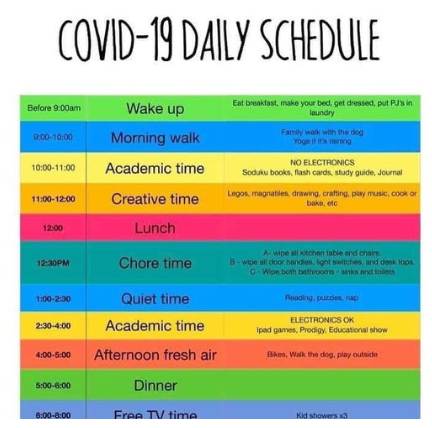
Helpful schedule for homeschooling during Corona Virus
4) Use of Technology
Try to ensure that your child has a scheduled task each day that doesn’t involve technology. When they do need to use technology, encourage them to turn off notifications and/or place their phone on aeroplane mode.
Don’t forget that our children are social beings – they will want to connect with their friends. Whether you use social media, Skype or gaming, allow them to socialise but schedule it into the day.
5) Create authentic learning experiences
Discuss ways that you can support family, friends, the elderly and others in the community. Show your children how you are shopping for your needs, not stockpiling unnecessarily, and explain why this is important. Consider ways they can help others, such as writing a letter to neighbours offering to collect medications or groceries.
6) Connect with your kids
Think of this time as a gift and not an inconvenience: go outside, go for walks, enjoy the sunshine, laugh together. No timetabling of sports, transport, music lessons!
7) Be kind to yourself
We are in an extraordinary period of time. Don’t put pressure on yourself to be the perfect ‘teacher’. Focus on your family’s well being.
FREE Resources to support your child
We searched for a number of resources that are free, fun and offer help to parents.
- Unsure if you’re showing your child the ‘correct’ way to do maths? Khan Academy is a great, free resource for instructional videos on many topics.
- Mystery Science is offering free science lessons during school closures.
- Want to combine English and art? Jarret J. Krosoczka, author of the “Lunch Lady” graphic novel series and the National Book Award finalist “Hey, Kiddo,” is hosting daily drawing webcasts on Youtube. It is suitable for all ages.
Check out our blogs for more ideas and tips.
Boys Love LFB – Here’s what they have to say!
Get boys reading in the digital age
Why write? Tips for reluctant writers
Brought to you by Tanya Grambower

An effective, engaging online program that improves literacy
Literacy is at the centre of your child’s development
Literacy should be engaging for kids, not a chore. Frustrated and disheartened at the number of boys who were achieving poorly and disengaged with literacy, we developed a program that is tailored specifically to boys, their interests and how they learn. Quality content is essential, which is why activities were written by qualified teachers who understand what motivates boys.
Why literacy results are falling
Who is the most literate nation in the world? Not Australia, we are not even in the top 20. PISA is the OECD’s Programme for International Student Assessment. Every three years it tests 15-year-old students from all over the world in reading, mathematics and science. The tests are designed to gauge how well the students master key subjects in order to be prepared for real-life situations in the adult world. Australian students’ scholastic performance on mathematics, science and reading were ranked at 21.
The literacy basics cannot be over-emphasised. Literacy for Boys covers comprehension, spelling, grammar and punctuation. Students who used Literacy for Boys weekly made an average gain of 18 months in their reading, comprehension and spelling ages – after only 18 weeks on the program!
See what parents and boys have to say….
“Since Caleb has started LFB there are no more tears for either of us. For the first time, he is remembering his spelling words – he scores 100% every time that I verbally test him. He now has so much confidence just from the short time we have been doing your program that he now asks straight away if he doesn’t understand something and we go over it again until he does understand it. I am just so excited. THANKYOU THANKYOU THANKYOU! LFB is really making MASSIVE POSITIVE changes to our son – thank you so much for making the program accessible. It has changed our lives.” (Michelle, mother of Caleb)
“I really enjoy the videos and the pictures. I like the questions and the challenges.” (Deacon, class 4A)
“The videos make me more interested in reading. I really like the spelling and the questions.” (Fletcher, aged 9)
“The program is online and information is current and suited predominantly for boys’ interests. My son is very excited to use it at home and in class.” (Samantha, mother of Andreas)
“This program is full of fun and interesting topics that have really grabbed my son’s attention and make him want to do the activities. Highly recommend it.” (Kate, mother of Alex)
Check out our blogs for more ideas and tips.
Boys Love LFB – Here’s what they have to say!
Get boys reading in the digital age
Why write? Tips for reluctant writers
Brought to you by Tanya Grambower

Latest NAPLAN results are only useful if they help us to improve
Monday’s release of 2019’s NAPLAN results will be concerning reading for many parents. The headlines of failing schools, teacher blame and poor student performance feed the debate about the validity of NAPLAN.
Let’s look at the mixed results from the latest data and how you can use NAPLAN to have a productive conversation with your child and school.
How to help your kids with english and maths – simple tips!
Boys have many great qualities – they can be curious, active, sensitive, open, affectionate, funny and great to be with. However, if they are struggling with their schoolwork this affects their confidence. Far too often I have seen boys (& girls) and teens slide into disengagement and become discouraged. Parents are also confused with newfangled approaches in education and changing rules for maths and reading techniques. What’s a parent to do in helping their kids with maths and english? Here are some simple tips:
Is the technology revolution good or bad for our kids and reading?
In this rapidly changing technological world, what has happened to children’s reading? Let’s take a look at amount of time that our children and teens are reading, their reading/academic achievements and how ereading (electronic reading) is changing the book landscape.
50+ books for boys! Provide your son with a diet of different books these holidays!
Developing a love of reading has alot to do with giving your son a choice in what he reads. But while free reign of ‘whatever he wants to read’ can be a good thing, I think most of us despair at our children’s reading selections at various times. I’m referring to the ‘toilet humour’ or cartoon types of books that they will read and re-read and re-read again! Boys do love these books for their escapism, simple plots (or lack of plot!) and avoidance of having to analyse a story/characters/theme etc. However, if you asked your son what would happen if he chose to eat only cake for the rest of his life he would see the benefits of why we need a range of different foods. Reading is the same – his brain needs a varied diet of different books. Here is a range of books to try to extend his taste into other genres. Aim to try some of these out on your 8 to 14 year old sons!